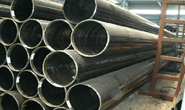Government/Policy

October 27, 2022
OCTG from Four Countries Now Officially Subject to Import Duties
Written by Laura Miller
Oil country tubular goods (OCTG) imports from four countries will now be subject to fresh antidumping and countervailing duties.
The news comes after the US International Trade Commission’s (ITC) final ruling that the US industry is being harmed by OCTG imports from Argentina, Mexico, Russia, and South Korea that are being sold at less than fair value, as well as by unfairly subsidized imports from both Russia and South Korea.
All five ITC commissioners voted in the affirmative that the US OCTG industry is being harmed by these imports, therefore the US Department of Commerce will apply the AD and CVD rates determined earlier this year to the imports.
‘Critical circumstances’ were alleged against Mexico and Russia, but the ITC made negative findings regarding those imports, therefore AD duties will not be applied retroactively before the case was filed last year.
The US petitioners who originally requested the case include Borusan Mannesmann Pipe US, PTC Liberty Tubulars, US Steel Tubular Products, Welded Tube USA, and the AFL-CIO.
The duties will now apply to hollow steel products of circular cross-section including seamless or welded oil well casing and tubing, as well as OCTG coupling stock, and will remain in place for at least five years. As required by law, the duties will be reviewed after five years to determine if they should be continued or allowed to ‘sunset’ or expire.
The OCTG industry, which in the US has been facing an undersupplied market and steep prices for some time now, is a major consumer of flat-rolled steel and plate. According to data from the ITC, there are 18 OCTG producers in the US with annual shipments valued at $2.886 billion. Apparent US consumption is said to be valued at $5.117 billion.
By Laura Miller, Laura@SteelMarketUpdate.com







